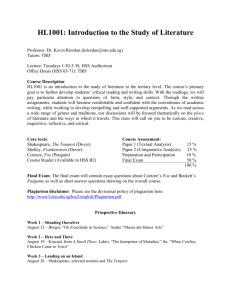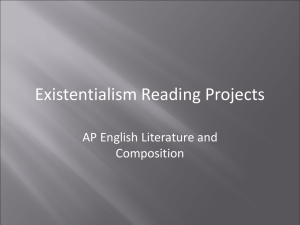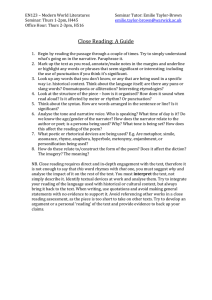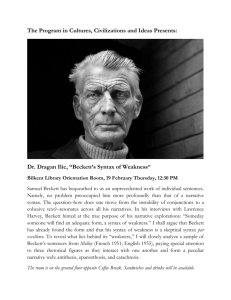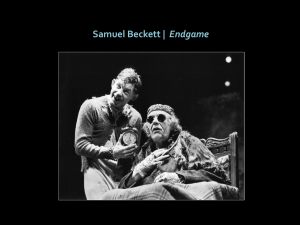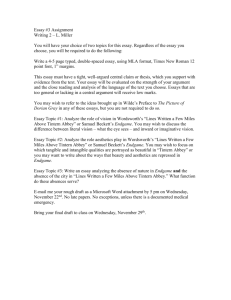EN123 – Modern World Literatures Seminar Tutor: Emilie Taylor-Brown
advertisement
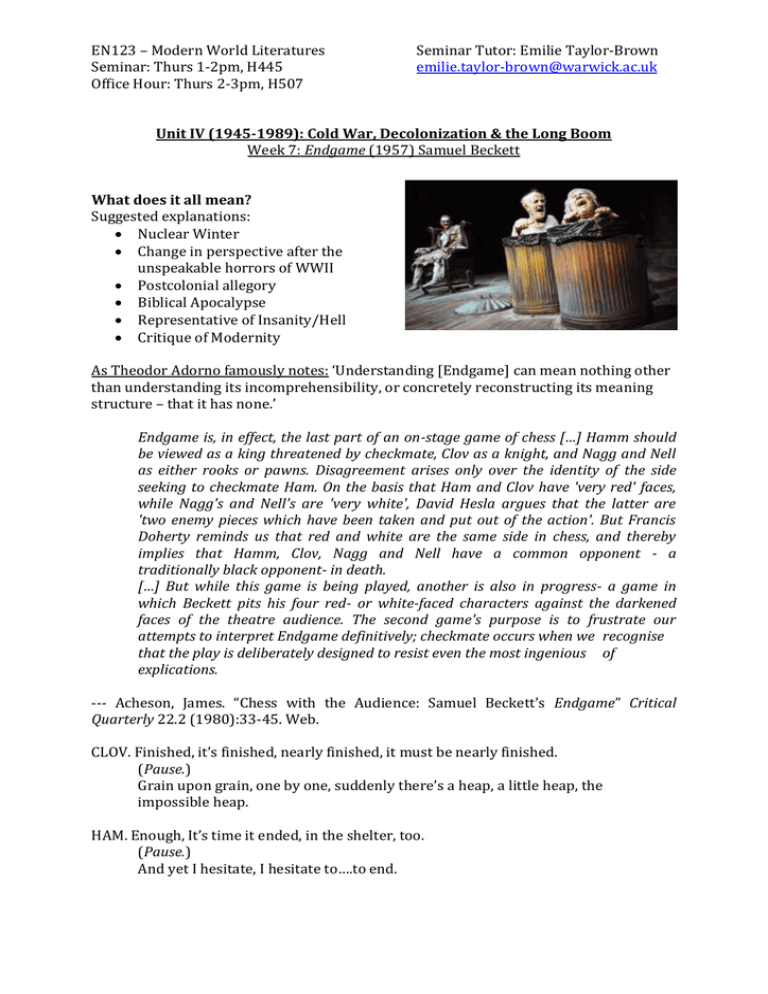
EN123 – Modern World Literatures Seminar: Thurs 1-2pm, H445 Office Hour: Thurs 2-3pm, H507 Seminar Tutor: Emilie Taylor-Brown emilie.taylor-brown@warwick.ac.uk Unit IV (1945-1989): Cold War, Decolonization & the Long Boom Week 7: Endgame (1957) Samuel Beckett What does it all mean? Suggested explanations: Nuclear Winter Change in perspective after the unspeakable horrors of WWII Postcolonial allegory Biblical Apocalypse Representative of Insanity/Hell Critique of Modernity As Theodor Adorno famously notes: ‘Understanding [Endgame] can mean nothing other than understanding its incomprehensibility, or concretely reconstructing its meaning structure – that it has none.’ Endgame is, in effect, the last part of an on-stage game of chess […] Hamm should be viewed as a king threatened by checkmate, Clov as a knight, and Nagg and Nell as either rooks or pawns. Disagreement arises only over the identity of the side seeking to checkmate Ham. On the basis that Ham and Clov have 'very red' faces, while Nagg's and Nell's are 'very white', David Hesla argues that the latter are 'two enemy pieces which have been taken and put out of the action'. But Francis Doherty reminds us that red and white are the same side in chess, and thereby implies that Hamm, Clov, Nagg and Nell have a common opponent - a traditionally black opponent- in death. […] But while this game is being played, another is also in progress- a game in which Beckett pits his four red- or white-faced characters against the darkened faces of the theatre audience. The second game's purpose is to frustrate our attempts to interpret Endgame definitively; checkmate occurs when we recognise that the play is deliberately designed to resist even the most ingenious of explications. --- Acheson, James. “Chess with the Audience: Samuel Beckett’s Endgame” Critical Quarterly 22.2 (1980):33-45. Web. CLOV. Finished, it’s finished, nearly finished, it must be nearly finished. (Pause.) Grain upon grain, one by one, suddenly there’s a heap, a little heap, the impossible heap. HAM. Enough, It’s time it ended, in the shelter, too. (Pause.) And yet I hesitate, I hesitate to….to end. EN123 – Modern World Literatures Seminar: Thurs 1-2pm, H445 Office Hour: Thurs 2-3pm, H507 Seminar Tutor: Emilie Taylor-Brown emilie.taylor-brown@warwick.ac.uk HAM. You’re leaving me all the same. CLOV. I’m trying. […] HAM. Well! I thought you were leaving me. CLOV. Oh not just yet, not just yet. […] HAM. I thought I told you to be off. CLOV. I’m trying. […] NAGG. I thought you were going to leave me. NELL. I am going to leave you. Points to Consider - What is the significance of the setting? The references to time? To nature? - Why are the characters physically deformed? - How is the play ‘Brechtian’ in feel, and to what effect is this technique employed? - What is the purpose of Nagg and Nell? - The characters’ are always trying to “leave” but mostly fail to, what is the significance of this? - Comment on the structure of the dialogue. i.e. the abundance of pauses and puns, questions and stories, repetition, nonsense, intertext. - Think about the symbolism of light, sun, ocean, dust, sand, darkness, blindness, and disability. - Is the play funny? CLOV. I see ….a multitude…. in transports ….of joy. (Pause. He lowers telescope, looks at it.) That’s what I call a magnifier. […] CLOV. Let’s see. (He looks, moving the telescope) Zero…. (He looks) …Zero… (He looks) …and zero. HAM. Nothing stirs. All is – CLOV. ZerHAM. (Violently): Wait until you’re spoken to! (Normal Voice) All is…all is… all is what? (Violently) All is what? EN123 – Modern World Literatures Seminar: Thurs 1-2pm, H445 Office Hour: Thurs 2-3pm, H507 Seminar Tutor: Emilie Taylor-Brown emilie.taylor-brown@warwick.ac.uk Endgame is a work central to the study of imperialism and postcoloniality. This is so not only because Endgame articulates the problems of language, identity, and origins that are deeply intertwined with Irish and other (post)colonial experience(s), but also because it offers a formidable and thoroughgoing critique of the overarching Hegelian or Manichaean paradigms of master and slave, oppressor and oppressed, that have repeatedly conspired with the course of history (and historiography) to produce the colonial subject and that, in the specific case of Ireland, have done so with an alarming and consistent violence. We cannot make Endgame "speak" about some assumed version of a cultural past or to an a priori notion of Irish "identity" that would help us fit Beckett, or the discursively enslaved Clov, neatly into any master narrative of the silenced and oppressed. --- Pearson, Nels C. ““Outside of here its Death”:Co-dependency and the Ghosts of Decolonisation in Beckett’s Endgame” ELH 68.1 (2001):215-239. Print. Beckett does not argue directly about science or technology […] rather he shows “how it is” […] that is, he ‘objectifies’ his diagnosis of the human condition by aiming his irony in Endgame at technology. Technological tools are used to highlight physical pain and disease in a pathetic manner: Hamm’s armchair on castors, his catheter to help him urinate, his spectacles to cover his blindness, and his parents’ ashbins as a kind of prosthesis for their missing legs. At the same time, there is an alarm clock to measure the end of time and a telescope to look at a world in ruins. --- Restivo, Giuseppina, “Melencholias and Scientific Ironies in Endgame: Beckett, Walther, Dürer, Musil” Samuel Beckett Today/Aujourd’hui 11 (2000):103-113. Print. Further Reading Acheson, James. “Chess with the Audience: Samuel Beckett’s Endgame” Critical Quarterly 22.2 (1980):33-45. Web. Adorno, Theodor, “Trying to Understand Endgame” New German Critique 26(1982):119150. Web. Pearson, Nels C. ““Outside of here its Death”: Co-dependency and the Ghosts of Decolonisation in Beckett’s Endgame” ELH 68.1 (2001):215-239. Print. Restivo, Giuseppina, “Melencholias and Scientific Ironies in Endgame: Beckett, Walther, Dürer, Musil” Samuel Beckett Today/Aujourd’hui 11 (2000):103-113. Print. Noguchi, Rei, “Style and Strategy in Endgame” English Dept at Florida State University Web. Feb 2014. < http://www.english.fsu.edu/jobs/num09/Num9Noguchi.htm >
